Sentenced to torment
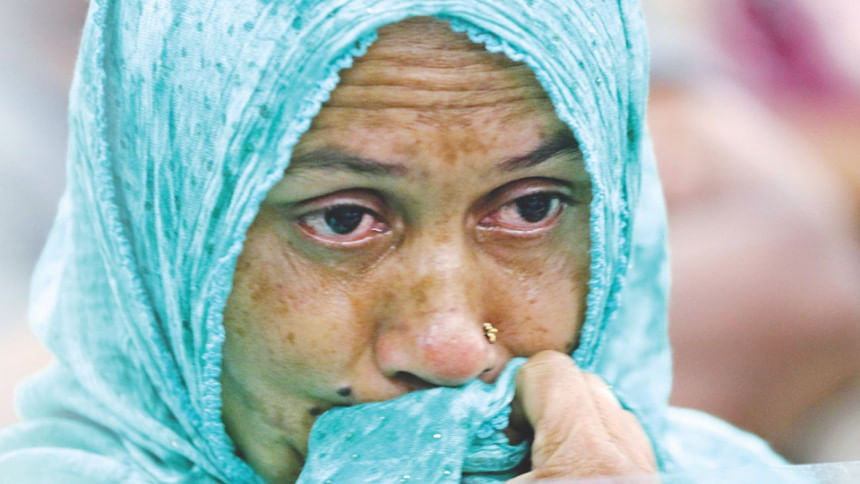
“We are spending sleepless nights ... he is my only son.”
Mother of Abdul Quader, one of the victims
It was around 10:15am yesterday.
In half an hour, a programme to mark the International Day of the Victims of Enforced Disappearances was about to begin at an auditorium of Jatiya Press Club. The air inside had already turned heavy with cries of the relatives of some victims.
As a woman, a victim's family member, stepped in, others hugged her and broke down in tears. After some time, they began consoling each other.
These people, who met on several occasions and are well aware of each other's torment, appeared to have developed a bond. One of them, 78-year-old Hazera Khatun, mother of a victim Sajedul Islam Suman, was heard telling another woman, “You have come! I don't know whether we would ever meet again. I am not in good health.”
Holding photographs of the disappearance victims, their mothers, wives, and children participated in many press conferences, human chains and rallies to demand the safe return of their loved ones.
Most of the families alleged that the victims were picked up by law enforcers who, however, shrugged off their responsibilities only by denying the allegation. The responsibilities of the state apparently ended there as well.
Speaking at yesterday's event, organised by a platform named “Mayer Daak” (Mother's Call), many of the family members voiced their anguish while talking about their ordeals.
While describing hers, Ayesha Ali, mother of victim Abdul Quader Bhuiyan Masum, said, “We are spending sleepless nights … he is my only son.”
“His image appears before me all the time. I am dying to hear him calling me 'Ma' again,” she said standing on the dais.
At one point, the woman broke down in tears. The audience also could not hold back tears.
Both Suman and Masum have been missing since they were allegedly picked up by Rab from the capital in December 2013.
“This is the 25th time I came to such a programme and have sought the government help in finding my brother,” said Suman's sister Marufa Islam.
“All these years, we have been reiterating our demand but the authorities only say that they are looking into the matter,” said a frustrated Marufa.
Saleha Begum, mother of missing Chhatra League leader SM Moazzem Hossain Topu, said, “My son is innocent. If he did anything wrong, he should be punished under the law.
“My question is what kind of a country is this where people are killed and their whereabouts remain unknown?”
Jhorna Khanam, wife of another victim, KM Shamim Akter, said, “We are angry and frustrated … we, as a member of a victim family, want the authorities to make sure not a single individual goes missing.”
Shamim was picked up on September 29, 2011 by five to six plainclothes men from the capital's Purana Paltan Lane.
“We want our relatives back. If you have killed them, admit it. If you have courage, you admit that you have killed our brothers, husbands, and children …. We can bear it,” Jhorna said.
She further vented her anger, alleging that the general diary she filed with Paltan Police Station over her husband's disappearance was yet to be turned into a case.
“I want to ask the investigation officer what he has found. Did you find whether Shamim is still alive?” she asked.
According to rights body Ain o Salish Kendra (ASK), as many as 544 people have allegedly fallen victims to enforced disappearance between 2010 and July 2018 in Bangladesh and over 300 of them are still missing.
The recent victims include former Bangladesh ambassador to Vietnam M Maroof Zaman and Ishrak Ahmed Fahim, a student of a Canadian university. They have remained traceless for nine and 12 months respectively.
Carrying photographs, family members of around 40 of the missing victims attended yesterday's programme.
Maroof's daughter Samiha Zaman alleged that instead of helping them, law enforcers sometimes misbehaved with them when they sought information on her father's whereabouts.
Adiba Islam Hridi, 7, daughter of Parvez Hossain, a missing Jatiyatabadi Chhatra Dal leader, reiterated her demand that she wants her father back.
“I want him back. I want to go to school with him,” she begged.
Speaking on the occasion, some members of the civil society and political parties expressed solidarity with the demands.
They also criticised the recent comments from Home Minister Asaduzzaman Khan that the country was not witnessing any incident of enforced disappearance and those who were going missing were disappearing following unsuccessful romantic relationships or failing in business.
Nagorik Oikya Convener Mahmudur Rahman Manna, said, “I feel extremely helpless when I see children holding the photographs of their fathers and pleading for their safe return.”
“The incident of enforced disappearance happens for political reasons,” he said.
Dhaka University's Prof CR Abrar asked, “Children want their fathers back, wives want their husbands and parents want their children … Are these illogical demands?”
Criticising the home minister for the comments, he said, “If I suppose you are correct, then why the law enforcers are failing to find them out? Why the victim's families are refused from filing cases?”
“These questions have no answer as the state itself is involved in the incidents,” he said.
Taking a dig at Asaduzzaman, Junaid Saki, chief coordinator of Ganasanghati Andolan, said people remain traceless for years but the minister claimed they went into hiding over romantic relationships and business.
“It's the duty of the home ministry to bring them back. If he [the minister] fails to do so, he should step down,” he said.

 For all latest news, follow The Daily Star's Google News channel.
For all latest news, follow The Daily Star's Google News channel. 

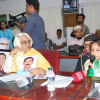

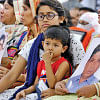

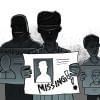

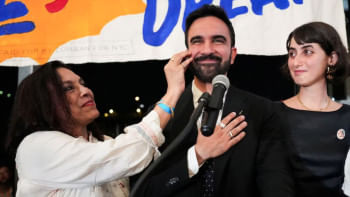
Comments